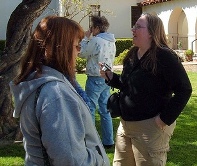 A week from tomorrow, we have our first monthly meal since deciding to train in ordinary life. The question of how to be intentional without being awkward still looms. I’ve no answer, only vague notions. Maybe answers come in the doing. For now, two skills seem critical: listening to the Spirit and listening to one another.
A week from tomorrow, we have our first monthly meal since deciding to train in ordinary life. The question of how to be intentional without being awkward still looms. I’ve no answer, only vague notions. Maybe answers come in the doing. For now, two skills seem critical: listening to the Spirit and listening to one another.
Listening to the Spirit. Our core group has spent hours together studying Scripture. In the pages of Amos, Habakkuk, Haggai, Ephesians, Matthew, James, 1 &2 Peter, Jude, and Isaiah we have begun to learn the language of the Spirit, to recognize his voice when he speaks. What remains is putting this into practice. I suspect that what is needed is the expectation that he will speak and the determination that we will listen (true listening of course, includes an appropriate response). Next Saturday’s dinner provides an excellent opportunity for us to listen together to the Spirit and compare notes after. I am certain we will improve this skill as we go along.
Listening to one another. Just as our study of Scripture teaches us the language of the Spirit, so also it provides a scaffolding of ideas upon which we can better listen to one another. In education, scaffolding is “a temporary support mechanism. Students receive assistance early on to complete tasks, then as their proficiency increases, that support is gradually removed.” Human language, verbal and non-verbal, is necessarily richer in person. We all say much with our bodies and our eyes. Bible study, in itself, is not real life; life is real life. Bible study is like scaffolding. Gathering face-to-face adds voice and touch to the scaffolding; voice and touch build the actual structure. As we gather with intention, we are able to give verbal and non-verbal feedback to help one another care more adequately for those in our midst. As with listening to the Spirit, listening to one another is a skill that improves with practice. I am certain we will improve.
“There is no such thing as a worthless conversation, provided you know what to listen for. And questions are the breath of life for a conversation.”


I think you’ve come to the same conclusion that I have: one purpose of Scripture is to help us identify when the Spirit is speaking to us.
Besides listening to the Spirit and one another, what role to you think responding to the Spirit and one another play “Training in Ordinary Life”?
-Alan
For me, response is somewhat tied up with listening (as noted in the parenthetical), though this needs to be teased out. In fact, it’s likely the next step in the series.
Thanks for the prompt.